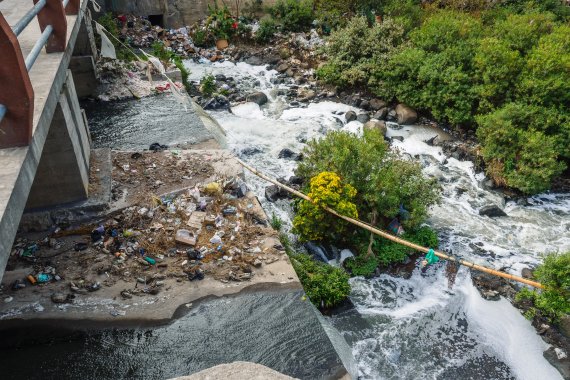
PFAS or PFCs are chemical compounds consisting of carbon and fluorine atoms. The abbreviation stands for "per- and poly fluorinated alkyl substances". They are exceptionally stable, water-repellent and heat-resistant and are therefore popular for finishing textiles.
PFAS are used in a wide variety of industries. For example, they are found in food packaging, cleaning agents and construction materials. The apparel industry uses PFAS to protect textiles from staining and moisture. They are coated with the chemicals to prevent moisture penetration - raindrops simply bead up. So it's very likely that your water-resistant outdoor jacket contains PFAS.
PFAS have been shown to be harmful to the environment and human health in several scientific studies. They are classified as toxic and carcinogenic and can damage organs such as the liver, kidneys, thyroid and immune system.
Particularly problematic is the fact that PFAS are persistent, meaning they cannot be degraded. They end up in the environment primarily during production, but also during the use of products containing PFAS: through wear and tear, during washing, and ultimately during their disposal.
Extensive scientific studies have shown that PFAS are widespread almost everywhere in the world. In rivers, lakes, oceans, groundwater, soils and even in the air. They have also been detected in our food: Fish, meat and vegetables are often contaminated and carry the toxic chemicals directly into our bodies.

In 2011, environmentalists from Greenpeace launched the Detox campaign with the aim of detoxifying the textile industry. A key demand on the industry is to eliminate wastewater emissions of hazardous chemicals. Throughout the supply chain. The organization also pressures policymakers to enforce stricter laws and regulations on the use of hazardous chemicals.
NGOs and scientists* have brought the issue to the attention of the general public over the past 20 years and have made a big difference with their research findings. Most people remember at least the discussion about toxic Teflon pans or cheap plastic toys.
Politicians have also reacted and many countries have taken measures to curb the spread of PFAS and have banned certain PFAS compounds. In the European Union, PFOA, PFOS and PFHxS are subject to mandatory authorization because they have been classified as "substances of very high concern." An EU-wide PFAS ban is currently being discussed. Unfortunately, however, a global solution is not in sight. In many countries, there is not even a specific labelling requirement for products containing PFAS.
More and more sustainable outdoor brands are going to great lengths to completely eliminate PFAS. And there are environmentally friendly alternatives when it comes to making textiles water-repellent. For example, if a fabric is woven appropriately, it can naturally be water-repellent as a result. In general, there are naturally water-repellent materials, such as wool or hemp. If waterproofing is required, some manufacturers now offer sustainable alternatives to silicone and PFAS made from beeswax or vegetable waxes.

Unfortunately, there is no uniform labeling or certification to date that indicates PFAS-free. Some brands identify their products via labels or tags that say "PFAS-free" or "without PFAS". There are also special seals that require the absence of the toxic chemicals. These include bluesign®, Oeko-Tex® or Green Shape. More and more brands, not only from the outdoor industry, are publicly committing to reducing or eliminating the use of PFAS.
1 - VAUDE is on the verge of a breakthrough.
At VAUDE, they've been working for a long time to banish PFAS from both their products and their supply chain. The brand is not only bluesign® certified, but has also committed to being consistently sustainable with its own Green Shape label. Currently, all clothing fabrics, sleeping bags, backpacks and shoes are already PFAS-free. By 2025, VAUDE also wants to equip tents with environmentally friendly PFAS alternatives.
2 - Patagonia with new GORE-TEX ePE membrane.
As of last fall, 78 percent of Patagonia's water-repellent materials are PFAS-free. The company has been working to drastically reduce the toxic chemicals since 2013 and also wants to eliminate them completely. The current collaboration with GORE-TEX represents another milestone in this effort: the newly developed ePE membrane forms a sustainable alternative made of microporous polyethylene (PE). The new products have been announced for 2024.
3 - Fjällräven has avoided PFAS for more than ten years.
The Swedish outdoor brand has developed its own guidelines for handling chemicals in cooperation with the Swedish Chemical Group and strictly adheres to avoiding them. From backpacks to rain jackets, absolutely all products at Fjällräven are impregnated fluorocarbon-free. Currently, the brand is also working on the production of PFC-free zippers.
4 - PFAS-free outdoor wear from Houdini
It took six years for outdoor brand Houdini to completely eliminate PFAS - in 2018, they did it: all products are free of the toxic chemicals. Instead, recycled hydrophobic polyesters are processed, whose membrane is also water-repellent. The company is also committed to a PFAS-free world through the Popfree project, sharing its sustainable innovations to support the transformation of the entire industry.
5 - PFC-free outdoor jackets from Bleed Clothing.
The sustainable outdoor brand from Upper Franconia has guaranteed PFC-free since its founding. For this, the company has teamed up with Sympatex. The company's membranes are made of 100% recycled PFC-free polyester, which is super water-repellent and can also be recycled again.
6 - Ortovox guarantees PFC-free even under extreme conditions
The mountain sports outfitter Ortovox has committed not only itself but also its suppliers to comply with the "Guide to Chemical Management and Compliance" and has been manufacturing all products without the use of PFCs since this year. The brand thus provides proof that extreme sports equipment can also be sustainable.
7 - Sustainable clothing, footwear and tents from Jack Wolfskin.
Since 2011, Jack Wolfskin realizes the bluesign® standards and announced with the spring-summer collection 2019 the complete renunciation of PFAS: all backpacks, bags and even all tents of the manufacturer are since then finished without per- and polyfluorinated chemicals.
 SustainabilityReady for the Green Deal? An Update for the Sports Industry
SustainabilityReady for the Green Deal? An Update for the Sports Industry
- Awards
- Mountain sports
- Bike
- Fitness
- Health
- ISPO Munich
- Running
- Brands
- Sustainability
- Olympia
- OutDoor
- Promotion
- Sports Business
- Textrends
- Triathlon
- Water sports
- Winter sports
- eSports
- SportsTech
- OutDoor by ISPO
- Heroes
- Transformation
- Sport Fashion
- Urban Culture
- Challenges of a CEO
- Trade fairs
- Sports
- Find the Balance
- Product reviews
- Newsletter Exclusive Area
- Magazine



